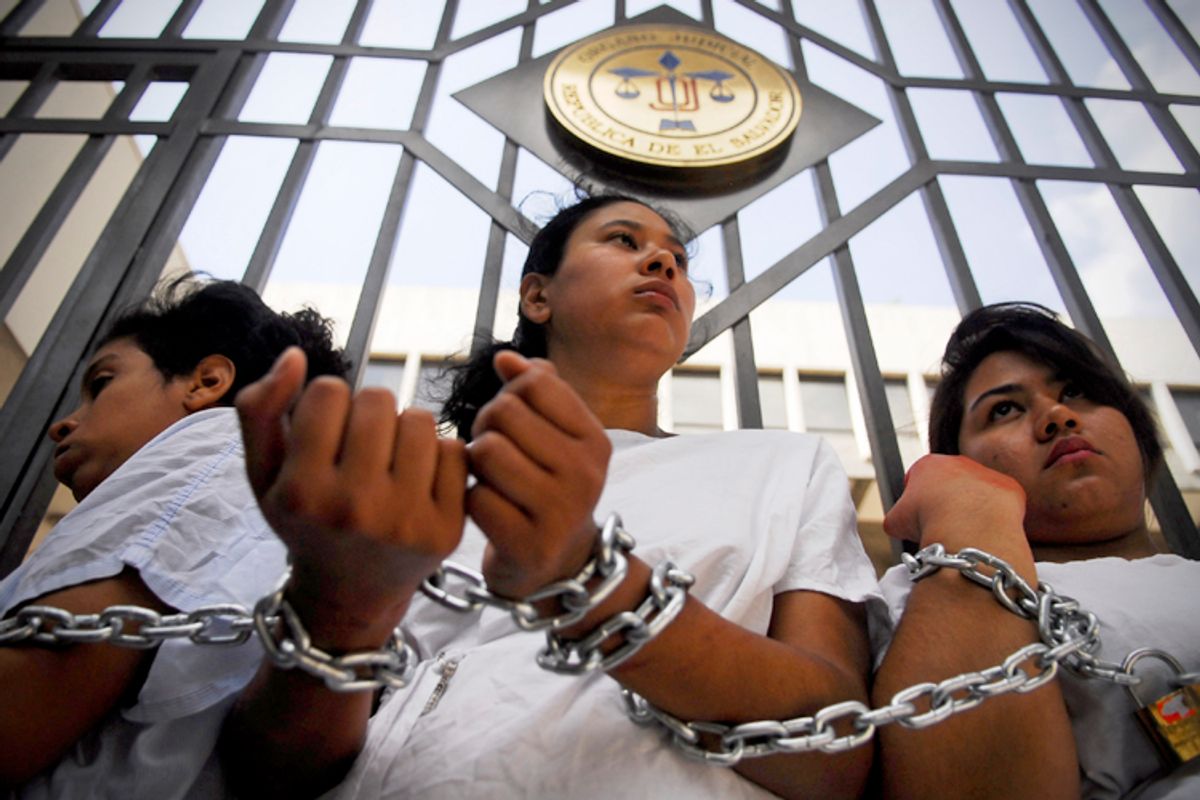This is the culture of life that abortion foes are trying to protect: On Wednesday, the Supreme Court of El Salvador upheld, by a 4–1 vote, its strict ban on abortion, refusing to allow a 22-year-old woman to end her pregnancy. That woman, and her baby, are likely now going to die.
The woman, known only Beatriz, is 26 weeks pregnant and has been suffering from lupus and kidney problems, which have worsened as her fetus has grown. The baby, meanwhile, has anencephaly – a developmental disorder in which parts of the brain and skull are missing. In affirming its decision, the court declared that "the rights of the mother cannot be privileged over those" of the fetus. One of Beatriz's lawyers, Víctor Hugo Mata, said: "The court placed the life of the anencephalic baby over Beatriz’s life. Justice here does not respect the rights of women."
El Salvador is far from the only place in the world where a fetus – even a nonviable one – takes precedence over the health and life of a woman. In Ireland right now, new obstetric emergency procedures are being implemented and new laws protecting the lives of mothers are finally being debated, following the brutal death of of Savita Halappanavar and her baby in a Galway hospital last fall. Amnesty International this month called Ireland's strict current abortion policy "out of line with international human rights standards."
It goes on, across the globe. Last summer, a pregnant Dominican teenager with leukemia died after being forced to delay chemotherapy by hospital officials who feared it would compromise her pregnancy. Abortion is illegal in the Dominican Republic. When she was finally permitted chemo, she miscarried, and soon after went into cardiac arrest.
Meanwhile, in a fascinating Vice story on Thursday, Martin Robbins writes about Peter, a Catholic doctor performing illegal abortions in the Kibera slums, an area where "sexual violence against woman – and girls – is widespread." As Robbins explains, for families who don't have access to the clinic home abortion is the more typical, "barbaric" route, including drugs and sharp objects. "Many women are dying from abortions being done in the villages," Peter says. "In Lindi you cannot wait a month without hearing that some woman is dying, due to abortion that was done by a quack somewhere. You can get two cases in a month."
This is still considered acceptable, right now, in 2013. In our own country, four years ago Friday, Dr. George Tiller was murdered in his church because he performed abortions. In states across the nation, clinics that provide abortion services are struggling to stay open, while draconian restrictions are being introduced again and again, forcing proponents of our constitutional rights to fight for what should already be unquestioningly ours.
On Tuesday, Dr. Henry Morgentaler died in Toronto at the age of 90. Morgentaler knew well the value of a human life. He was a survivor of Auschwitz and Dachau. For his work championing safe, legal abortions and training doctors to perform them, he received death threats and served 10 months in jail. But he pressed on, for over 20 years, helping bring about sweeping reform in Canadian laws protecting the "life, liberty and security" of women. He did it because he understood that you can't be pro-life and cool with letting women die.
Morgentaler started doing illegal abortions, he said, "to provide a necessary medical service because women were dying at the hands of butchers and incompetent quacks, and there was no one there to help them. The law was barbarous, cruel and unjust. I had been in a concentration camp, and I knew what suffering was. If I can ease suffering, I feel perfectly justified in doing so."
And in a world where far too many women suffer still, the fight for our lives is as urgent as ever.

Shares